Are you considering getting a Greater Swiss Mountain Dog as a pet? If so, you are in for a delightful experience. These dogs are known for their loyalty, intelligence, and gentle nature. They make excellent family pets and are great with children. The Greater Swiss Mountain Dog is a large breed, but their size is matched by their big hearts. They are affectionate and love to be around their humans. In this article, we will explore the characteristics of this breed and help you decide if a Greater Swiss Mountain Dog is the right pet for you.
Breed Category: Working
Country of Origin: Switzerland
Average Size:60-72 cm
Average Weight:50-70 kg
Average Life Span: 8-11 years
Grooming Requirements: Moderate
Exercise Requirements:High
History and Origin
The Greater Swiss Mountain Dog, also known as the Swissy, is a large breed of dog that originated in Switzerland. The breed is believed to have descended from the Molossus dogs that were brought to Switzerland by the Roman armies during their conquests. These dogs were then crossed with local Swiss dogs, resulting in the Greater Swiss Mountain Dog we know today.
The breed was primarily used as a working dog, helping farmers with tasks such as herding, guarding, and pulling carts. They were also used as draft dogs by the Swiss army during World War II. However, by the early 1900s, the breed had almost become extinct due to the rise of other breeds such as the Bernese Mountain Dog and the St. Bernard.
In the 1900s, a group of Swiss dog enthusiasts began a breeding program to revive the breed. They used the remaining Swissys and crossed them with other breeds such as the Bernese Mountain Dog and the Great Dane to increase the breed’s numbers. The breed was officially recognized by the Swiss Kennel Club in 1908 and by the American Kennel Club in 1995.
The Greater Swiss Mountain Dog is a large, muscular breed that stands between 23 and 28 inches tall and weighs between 85 and 140 pounds. They have a short, dense coat that is typically black with rust and white markings. The breed is known for its loyalty, intelligence, and gentle nature, making them great family pets.
However, due to their size and strength, they require early socialization and training to prevent any potential behavioral issues. They also require regular exercise and mental stimulation to keep them happy and healthy.
In conclusion, the Greater Swiss Mountain Dog is a breed with a rich history and a strong connection to Switzerland. Despite almost becoming extinct, the breed was revived through the efforts of dedicated breeders. Today, they are beloved family pets and continue to be used as working dogs in some parts of the world.
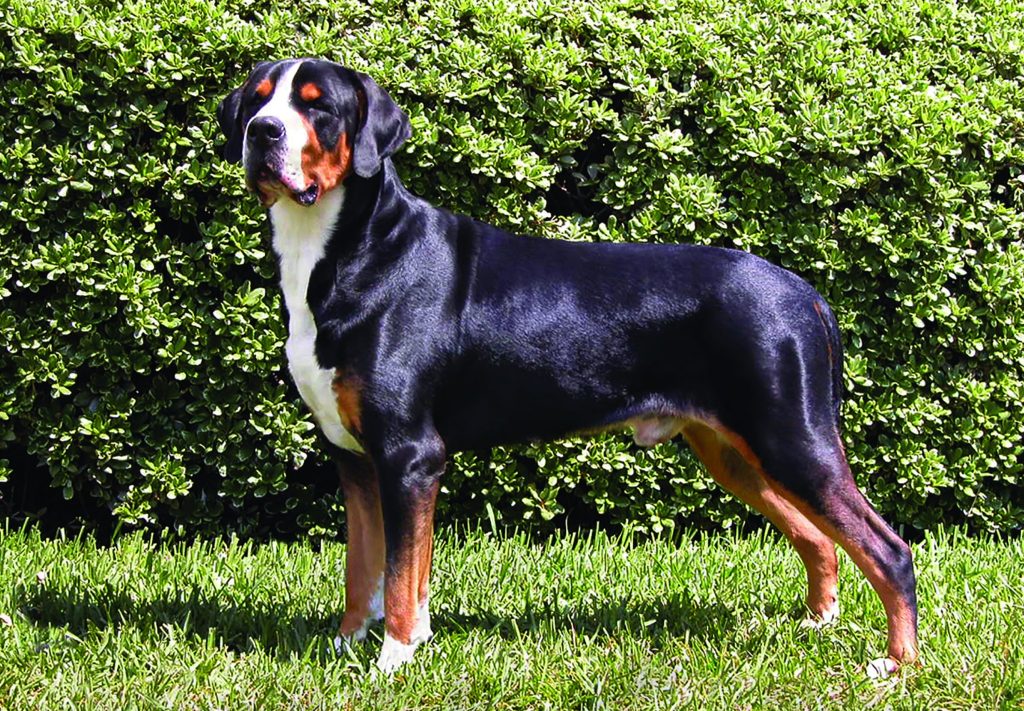
Size and Breed Category
The Greater Swiss Mountain Dog is a large breed of dog that falls under the category of working dogs. They are known for their muscular build and strong physique, which makes them ideal for tasks such as pulling carts and guarding livestock. These dogs can weigh anywhere between 50-70 kg and stand at a height of 60-72 cm at the shoulder. They have a short, dense coat that comes in a variety of colours, including black, white, and rust. The breed is known for its loyalty and protective nature, making them excellent family pets.
The Greater Swiss Mountain Dog is a breed that originated in Switzerland and was used as a working dog in the Swiss Alps. They were bred to be strong and sturdy, capable of pulling heavy loads and protecting their owners from predators. The breed is known for its intelligence and trainability, making them ideal for tasks such as search and rescue and therapy work. They are also known for their gentle nature and love of children, making them excellent family pets. Despite their large size, these dogs are known for their calm and gentle temperament, making them a popular choice for families with children.
Fur Length and Colour
The fur of the Greater Swiss Mountain Dog is typically short and dense, providing excellent protection against the cold weather. The fur is also straight and smooth, giving the dog a sleek and polished appearance. The fur colour of the Greater Swiss Mountain Dog is typically black with rust and white markings. The rust markings are usually found above the eyes, on the cheeks, on the legs, and on the chest. The white markings are usually found on the chest, on the feet, and on the tip of the tail. The combination of these colours gives the Greater Swiss Mountain Dog a striking and distinctive appearance.
The length of the fur on the Greater Swiss Mountain Dog varies depending on the season. During the winter months, the fur is thicker and longer, providing extra warmth and protection against the cold. During the summer months, the fur is shorter and thinner, allowing the dog to stay cool in warmer temperatures. The fur on the Greater Swiss Mountain Dog is also water-resistant, which is useful for dogs that enjoy swimming or playing in the rain. The fur is easy to maintain and requires regular brushing to keep it looking healthy and shiny.
Termperament and Trainability
The Greater Swiss Mountain Dog is a breed that is known for its calm and composed temperament. They are generally friendly and affectionate towards their owners and are great with children. However, they can be reserved with strangers and may require proper socialization to prevent any aggressive behavior. They are also known to be protective of their family and can make excellent watchdogs.
When it comes to trainability, the Greater Swiss Mountain Dog can be a bit stubborn at times. They are intelligent dogs but may require a firm and consistent approach to training. Positive reinforcement techniques such as treats and praise can be effective in motivating them. They are also known to have a strong work ethic and can excel in activities such as obedience, agility, and tracking. However, it is important to note that they may have a tendency to become bored with repetitive training sessions and may require variety in their training routine.
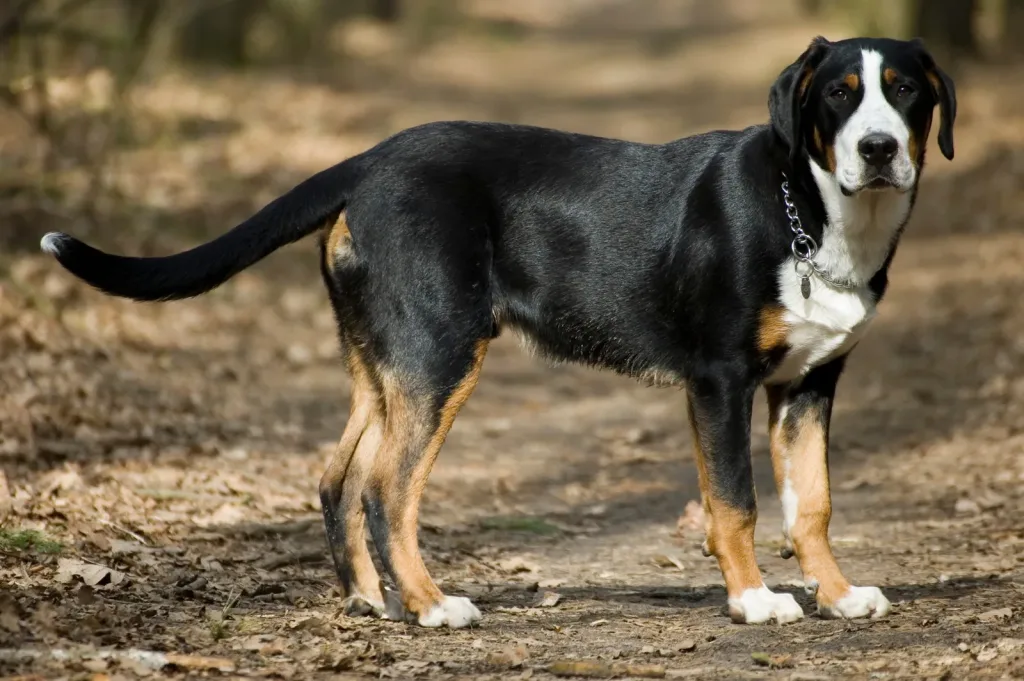
Known Health Conditions
Greater Swiss Mountain Dogs are prone to certain health conditions that owners should be aware of. One of the most common issues is hip dysplasia, which is a genetic condition that affects the hip joint. This can cause pain, lameness, and arthritis in the affected joint. Owners should ensure that their dog’s breeding lines have been screened for hip dysplasia to reduce the risk of their dog developing this condition. Another common health issue in Greater Swiss Mountain Dogs is bloat, which is a life-threatening condition where the stomach fills with gas and twists on itself. This can cause a blockage of blood flow to the stomach and other organs, leading to shock and death if not treated promptly. Owners should be aware of the signs of bloat, such as restlessness, drooling, and a distended abdomen, and seek veterinary care immediately if they suspect their dog is suffering from this condition.
In addition to hip dysplasia and bloat, Greater Swiss Mountain Dogs are also prone to other health conditions. One of these is elbow dysplasia, which is a similar condition to hip dysplasia but affects the elbow joint. This can cause lameness and arthritis in the affected joint. Another health issue that can affect Greater Swiss Mountain Dogs is epilepsy, which is a neurological condition that causes seizures. This can be managed with medication, but owners should be aware of the signs of a seizure and seek veterinary care if their dog experiences one. Finally, Greater Swiss Mountain Dogs are also prone to certain eye conditions, such as cataracts and progressive retinal atrophy, which can cause vision loss. Regular eye exams by a veterinary ophthalmologist can help detect and manage these conditions.
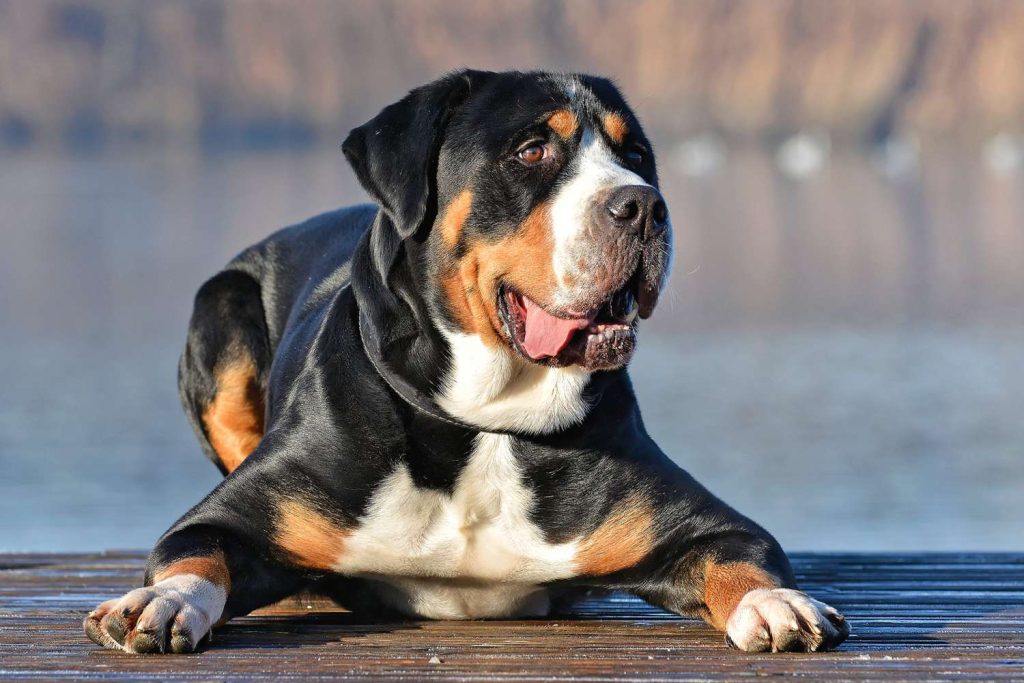
Openness to Strangers
The Greater Swiss Mountain Dog is a breed that is known for its friendly and welcoming nature towards strangers. This breed is often described as being sociable and outgoing, making them a great choice for families who enjoy having visitors over. They are not typically aggressive towards strangers and are known to be quite gentle with children. This breed is also known for being loyal and protective of their owners, which can make them a great choice for those who are looking for a dog that will be both a companion and a protector.
In terms of their behaviour towards strangers, the Greater Swiss Mountain Dog is known to be quite curious and inquisitive. They are often eager to meet new people and will approach strangers with a wagging tail and a friendly demeanour. This breed is also known for being quite intelligent, which can make them easy to train and socialise. However, it is important to note that like all breeds, the Greater Swiss Mountain Dog will require proper socialisation and training in order to ensure that they are well-behaved around strangers. With the right training and socialisation, this breed can make a great addition to any family.
Playfulness Level
The Greater Swiss Mountain Dog is a highly playful breed that loves to engage in various activities. They are known for their high energy levels and their love for playtime. These dogs are always up for a game of fetch or a run around the park. They are also great at playing hide and seek and love to chase after toys. The Greater Swiss Mountain Dog is a great companion for families with children as they are always ready to play and have fun. They are also great at playing with other dogs and enjoy socializing with their furry friends.
The playfulness level of the Greater Swiss Mountain Dog is one of their most endearing qualities. They are always eager to play and have fun, and their energy levels are contagious. These dogs are great at keeping their owners active and engaged, and they are always up for a new adventure. Whether it’s a game of tug-of-war or a hike in the mountains, the Greater Swiss Mountain Dog is always ready to play. They are a great addition to any family that loves to have fun and stay active.
Suitability as a Pet for Children
Greater Swiss Mountain Dogs, also known as Grosser Schweizer Sennenhund, have a friendly and gentle nature, making them a great pet for children. They are loyal and protective of their family, making them a great watchdog. They are also intelligent and easy to train, making them a great companion for children who want to learn how to train a dog. They are a large breed, so they require plenty of exercise and space to run around. However, they are not overly energetic, so they can also be content with a daily walk. Overall, Greater Swiss Mountain Dogs can make a great addition to a family with children who are looking for a loyal and gentle companion.
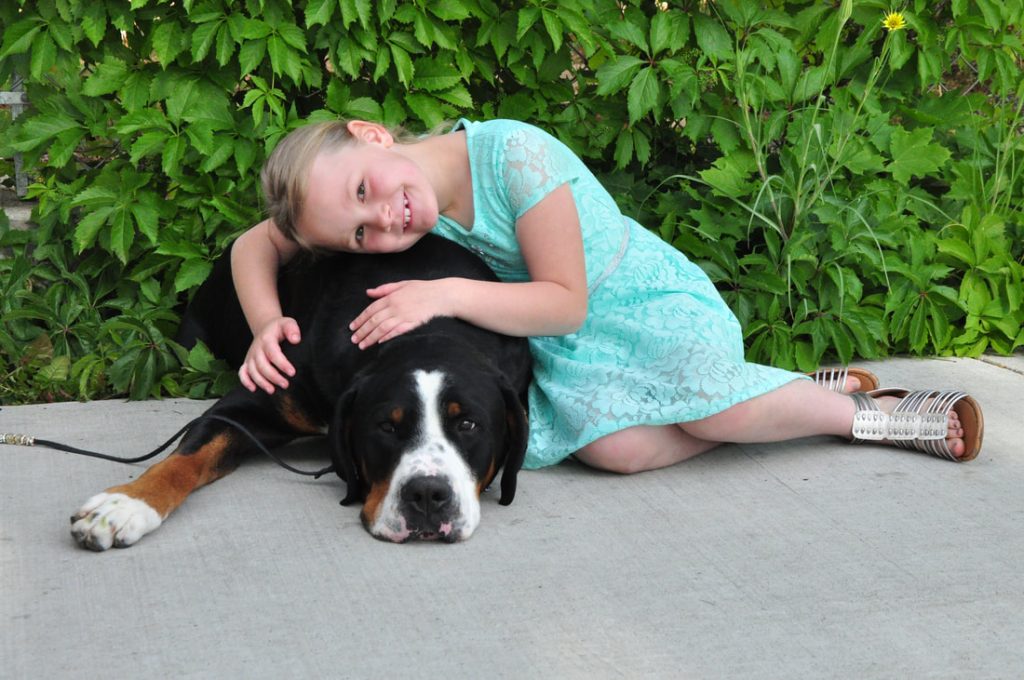
Exercise Needs
Greater Swiss Mountain Dogs are known for their strength and endurance, making them a great choice for owners who enjoy outdoor activities. These dogs require a significant amount of exercise to maintain their physical and mental health. A daily walk of at least an hour is recommended, but they also benefit from more intense activities such as hiking, running, and swimming. It is important to note that these dogs have a tendency to overheat, so exercise should be done during cooler times of the day and in shaded areas. Additionally, they enjoy mental stimulation through activities such as obedience training and agility courses. Overall, Greater Swiss Mountain Dogs require a balanced combination of physical and mental exercise to keep them happy and healthy.
In addition to regular exercise, Greater Swiss Mountain Dogs also require a healthy diet to maintain their energy levels. These dogs have a tendency to gain weight, so it is important to monitor their food intake and provide them with a balanced diet. High-quality dog food that is rich in protein and low in fat is recommended. Owners should also be mindful of their dog’s portion sizes and avoid overfeeding. In addition to a healthy diet, these dogs require regular veterinary check-ups to ensure they are in good health. Overall, Greater Swiss Mountain Dogs require a combination of exercise, a healthy diet, and regular veterinary care to maintain their physical and mental well-being.
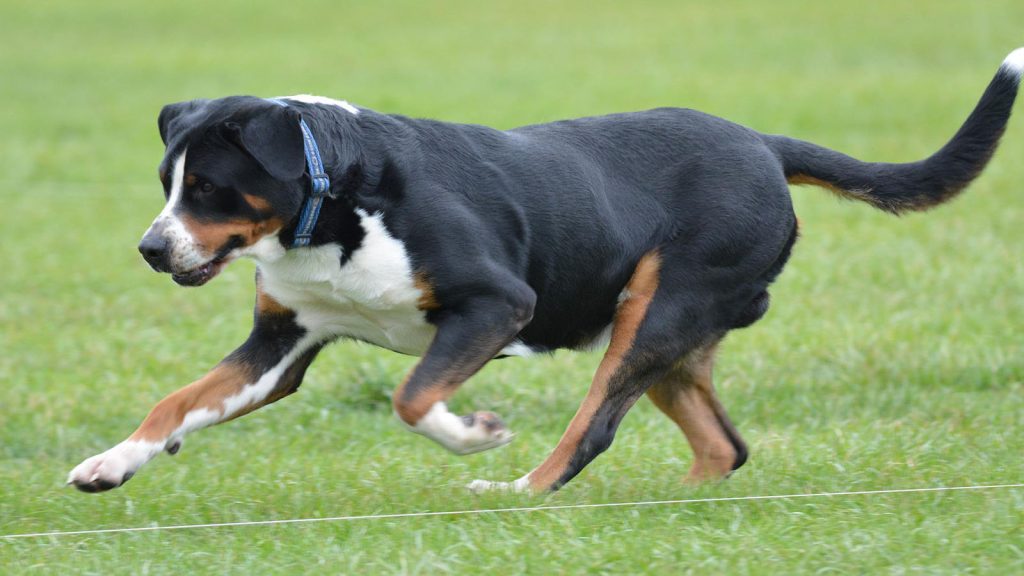
Suitability for a Multi-Pet Family
Greater Swiss Mountain Dogs have a reputation for being friendly and sociable with other pets. They are known to get along well with cats and other dogs, as long as they are properly socialized from a young age. It is important to supervise interactions between a Greater Swiss Mountain Dog and other pets, especially if they are meeting for the first time. With proper training and socialization, Greater Swiss Mountain Dogs can make great companions for other pets.
Housing Requirements
Greater Swiss Mountain Dogs require a spacious and comfortable living environment that can accommodate their large size and active nature. They need a minimum of 30 square meters of indoor space, with a ceiling height of at least 2.5 meters. The flooring should be non-slip and easy to clean, as these dogs tend to drool and shed a lot. A separate sleeping area with a comfortable bed is also necessary, as they need a lot of rest to maintain their energy levels. Additionally, they require access to a secure outdoor area where they can exercise and play. The outdoor space should be at least 50 square meters, with a high fence to prevent them from escaping. It should also have shade and shelter from the elements, as these dogs are sensitive to extreme temperatures.
Greater Swiss Mountain Dogs have a hearty appetite and require a balanced diet to maintain their health and energy levels. They need to be fed twice a day, with a total of 1.5 to 2.5 kilograms of high-quality dog food. It is important to monitor their weight and adjust their food intake accordingly, as they are prone to obesity. Fresh water should be available at all times, and their feeding area should be kept clean and hygienic. Additionally, they require regular grooming to keep their coat healthy and shiny. This includes brushing their fur at least once a week, trimming their nails, and cleaning their ears and teeth. Regular exercise and playtime are also essential to their well-being, as they are an active breed that enjoys outdoor activities.
Summary
The Greater Swiss Mountain Dog is a popular choice for pet owners due to their friendly and loyal nature. They are known for their intelligence and adaptability, making them suitable for families with children or other pets. They require regular exercise and mental stimulation, but are generally low maintenance in terms of grooming. As with any dog, early socialization and training is important to ensure they are well-behaved and obedient. Overall, the Greater Swiss Mountain Dog can make a wonderful addition to the right household.
Greater Swiss Mountain Dog FAQS
Yes, Greater Swiss Mountain Dogs are intelligent and eager to please, making them relatively easy to train.
Yes, Greater Swiss Mountain Dogs are known for being great with children and make excellent family pets.
Yes, Greater Swiss Mountain Dogs are prone to hip dysplasia, bloat, and elbow dysplasia. Regular vet check-ups are recommended.
Greater Swiss Mountain Dogs are not known for excessive barking, but they may bark to alert their owners of strangers or unusual activity.
Yes, Greater Swiss Mountain Dogs are an active breed and require at least 1-2 hours of exercise per day.
The amount of food a Greater Swiss Mountain Dog needs depends on their age, weight, and activity level. Generally, they require 3-4 cups of high-quality dog food per day.
Greater Swiss Mountain Dogs have a thick double coat and should be brushed at least once a week to prevent matting and shedding.
A Greater Swiss Mountain Dog can grow up to 65-72 cm in height.
The average weight of a Greater Swiss Mountain Dog is between 50-70 kg.
The average lifespan of a Greater Swiss Mountain Dog is 8-11 years. Proper diet, exercise, and regular vet check-ups can help prolong their lifespan.
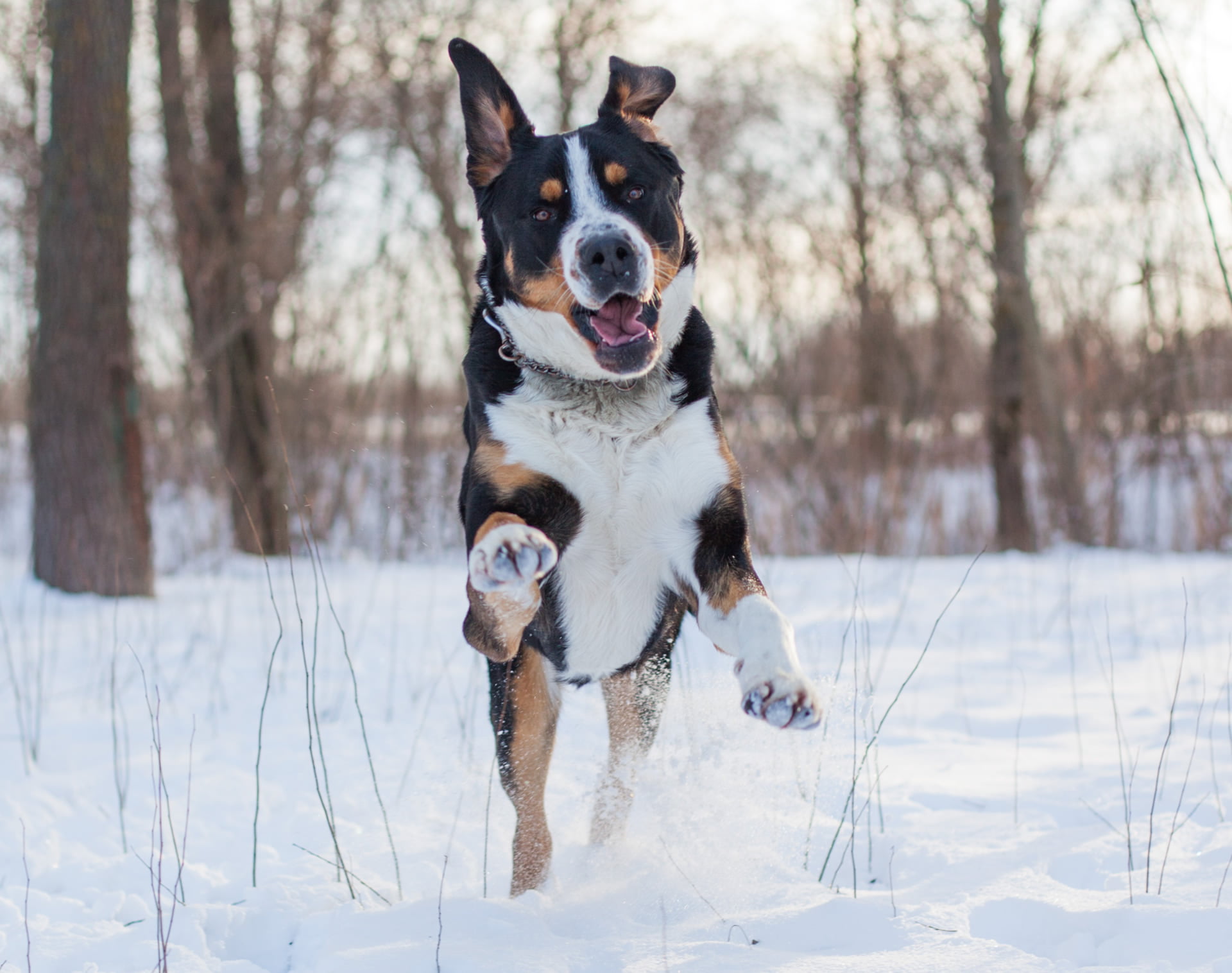
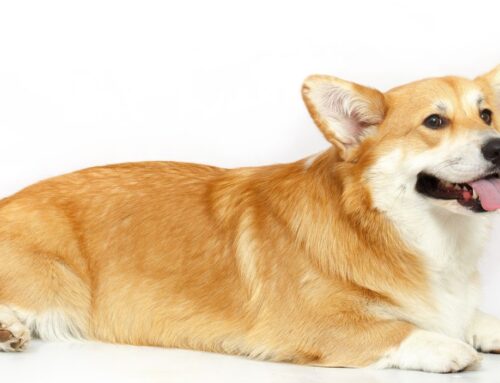
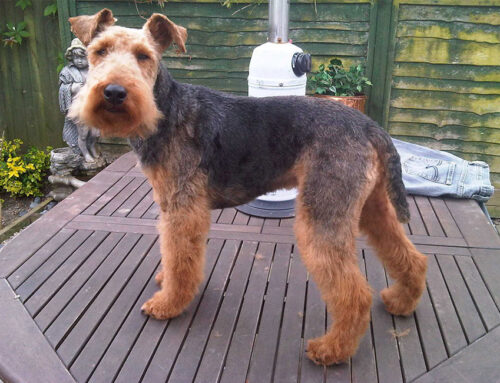
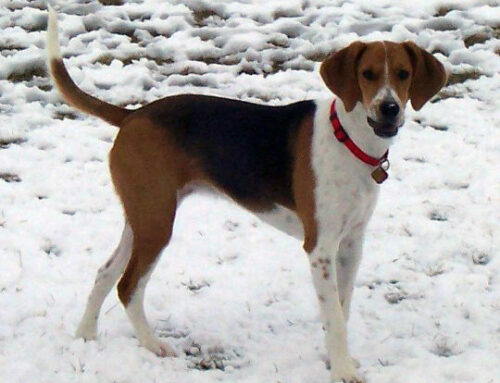
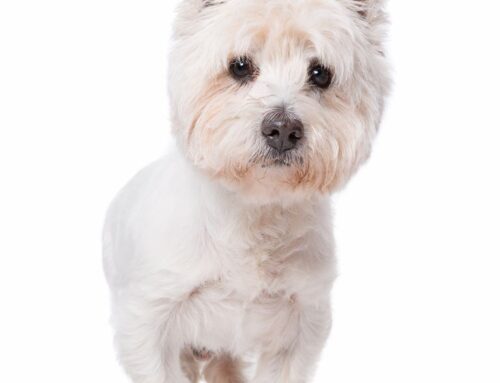
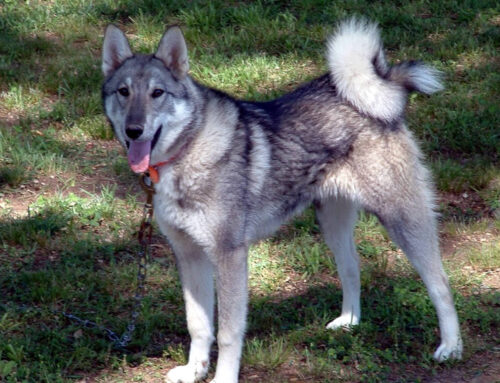
Hi
Is there any greater swiss mountain dog breeders in Australia
Thanks